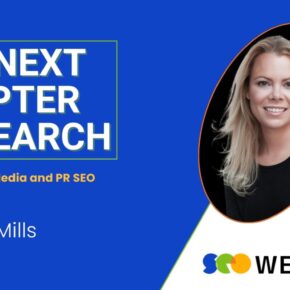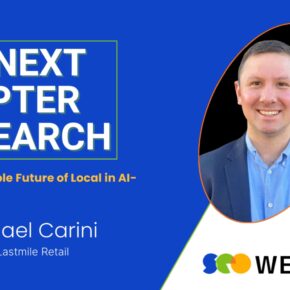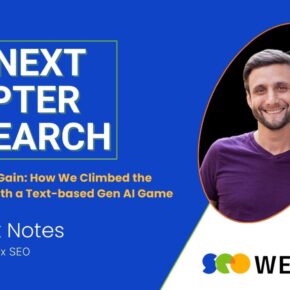
About Dawn Anderson
Dawn Anderson is an SEO consultant, educator, and international speaker specializing in technical SEO, information retrieval, and digital marketing strategy. She is the founder of the digital marketing agency Bertey, holds advanced degrees in marketing, and is pursuing further studies in data science. Dawn has lectured, judged global Search Awards, and provided SEO consulting and training for brands worldwide.
Dawn's SEO Week Session
- Title: From Villains to Heroes
- When to Watch: Day 2 | Tuesday, April 29th | 4:15 pm
- Session Abstract: Does the information retrieval industry’s outdated, siloed, and biased misperception of modern SEO have the potential to hurt their industry and search overall? Dawn Anderson will show that the reality is modern SEOs are heroes, not villains.
- IR industry’s outdated view of modern SEO – Are we all just spammers?
- What does SEO contribute to modern search – the bridge SEO represents takes us from villains to heroes.
- IR research rebuking SEO, which arguably doesn’t understand SEO basics.
- Whilst IR researchers focus on Gen AI, the web burns and SEOs help to put out the fires.
Transcript
Garrett: Okay, here we go. Welcome to The Next Chapter of Search produced by SEO Week and iPullRank. Today I’m joined by Dawn Anderson. Dawn is the Principal Consultant and Managing Director at Bertey. She is going to tell us all about information retrieval. Thanks for joining me today, Dawn.
Dawn: Thank you for asking me, Garrett, and I’m really pleased to be here. And I just realized that we have matching tops on. We have matching colors.
Garrett: Oh, well, you got the email where I said you have to wear purple for the interview, and you came wearing purple. It’s very royal, very royal.
Dawn: Yeah, yeah, yeah.
Garrett: So, I’d love to know kind of where your perspective, where are we currently in the state of SEO, especially in the context of information retrieval?
Dawn: Right, well, as I say, I think we always have to prefix any conversation about information retrieval by saying, “actually web search literally is information retrieval. It’s an aspect of information retrieval.” So, Google and all search engines are part of information retrieval because there is sometimes that detachment that people think that they are separate things, but literally search is the same thing.
I think we’re in a stage now where ultimately the whole machine, if you like, the whole IR pipeline, the whole web search pipeline is being rebuilt from the ground up. Especially the multimodal aspect of it – historically, I think we’re increasingly moving away from the 10 blue links scenario, much more multimodal, much more intent-driven. So, I mean, ultimately we are in this scenario now where Gen AI is definitely coming through. There are some challenges. We know that there’s been all these quality issues over the past year or so as they’re trying to push these things through. But increasingly, I believe that we’ll get grounding. We will get more grounding, particularly as we don’t let up on structured data, we keep going with schema and so forth. Search engines are literally going to just keep learning from all the data and so forth. And RAG and then Graph RAG as well is going to come through to reinforce further. So yeah, so I think that we’ll have a very rounded search experience. We’re going to definitely have AI agents coming through. So that’ll be another experience as well. It’ll just be increasingly holistic for the searcher.
Garrett: So, there’s so many moving parts that are happening right now. For your presentation at SEO Week, what do you think, what is the topic that’s really going to be valuable for all the attendees there?
Dawn: I think, well, I’m hoping to illustrate the changes that are happening, not just in SEO. Because I think we kind of think that it’s just happening to us and nothing else is happening around. But the changes that are happening in the IR industry and web search industry overall are just humongous. So, I wanted to kind of illustrate those changes that are going on in the background that we don’t know about.
The struggles that search engines are going through, if you like, the developments there, particularly with regards to some of the iterative changes in how maybe quality rating is done and how algorithmic pushouts are done and so forth. Because that will impact us. We had an ever flux of core updates this past few months. Every time we have those, there is some impact somewhere. So, I’m going to be covering some of that, looking at how that’s, why that’s happening, and what we can do to address that. And just look at the changing SERPs, if you like.
Garrett: Yeah, it’s so important. I feel like your talk will change people’s perspectives in terms of that volatility that you’ve really been focusing on. Based on whether it’s changing algorithm updates or just the daily dynamic nature of SERPs, what are some of the practical takeaways? Like what should people do right now for SEO, taking all that into consideration?
Dawn: I think that they definitely need to work on more of a breadth and precision aligned. So, precision to query intent is really key, really key. I think that we need to definitely take a broad approach as well. Make sure that we have comprehensiveness of the topic aligned with our audience. And yeah, I think we just need to take a very rounded view, appreciating that query intent shift is constantly happening. Dynamic re-ranking is happening. We shouldn’t expect us to see the same results for a keyword constantly.
And I think there is an obsession, particularly when you’re dealing with some clients, if you drop down a couple of places, that they almost feel that they have ownership of certain keywords, and that’s not the case anymore because intent is constantly, constantly shifting. So, I think precision, good content strands, comprehensiveness of topic, understanding your audience really, really well, and alignment is going to be the big takeaway, really.
Garrett: Oh, that’s so good. Because I mean, to your point, and this seems to be the theme of what you’re thinking, is nothing is static anymore. SEO, not that it’s ever been a set it and let it, but you really can’t just rest on your laurels, say “I did work, and that I can now just let that compound and do its own thing.” What do you think is this future of SEO? What’s next for web search, from your perspective?
Dawn: I don’t think it’s going away anytime soon, but it’s going to be different. It’s going to be completely different. I think, I mean, well, for instance, it was pretty funny the other day…somebody on Facebook had pulled together, somebody had asked a question of DeepSeek, actually. I mean, I know that this is not web search, but I think eventually there’ll be almost like a blurring of lines between these AI agents, and there’ll be the chatbots, and obviously, I think there will be definitely a blurring of offerings, if you like, with people seeking information in many, many ways all of the time. But somebody had actually asked a question of DeepSeek and said, “Build me a team of the best 25 SEOs in the world.” And I mean, it was nice. I was on the list, which was quite flattering, really. I thought, “where the heck did that come from?” Because obviously I’ve been very quiet for the past few years. I’ve not been on any of the roundup lists, and I’ve not been on any of the hundred little SEOs that you should follow and so forth.
So, I think these machines are just going to surface information from the deepest depths and just bring it up from nowhere. So, because I was surprised to find myself on that list, I was like, “Oh.” But the point is, I just think that information will just be bubbled up from all over the place, everywhere, everywhere.
Garrett: That’s so interesting. And last question, I guess, do you think Google will maintain its market dominance going forward, or what likelihood do you think that we’ll see actual search engine competitors, or just if search behavior changes, other competitors like the DeepSeeks and the Chats GPT in the world?
Dawn: Yeah, I think that they’ve certainly got their work cut out. I think that they need to up their game. I mean, we’re presuming that they’re going to stand still, and they’re not, of course, and they’re going to improve. And they’ve moved their search guy into innovation, and he’s a brilliant engineer, regardless of what anybody thinks from a search and commercial perspective. So, they have got brilliant engineers. I think it’s going to be a battle. It’s going to be a battle. I don’t know whether they’ll dominate anything like this as much as they have, but I think that maybe the opportunity will grow, maybe because people will just be searching everywhere, different surfaces. So, I think they’re going to have their work cut out, let’s put it that way.
Garrett: There you go. So really fascinating stuff. For any of you who are still considering getting a ticket for SEO Week, we will be in New York City, April 28th to May 2nd. Dawn Anderson is going to be giving a dynamic, dynamic presentation along with all of our other 35+ speakers. It’s going to be an incredible event. Thank you so much for joining me today, Dawn. I really appreciate it.
Dawn: Thank you. Thanks, Garrett.Garrett: My name is Garrett Sussman, and this is brought to you by SEO Week and iPullRank. Check out the next interview coming soon.



